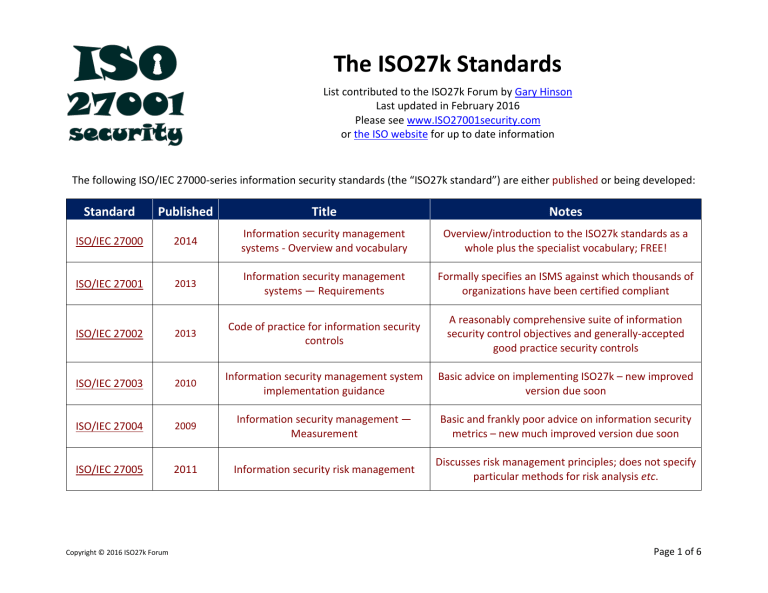

Unlike other standards, the ISO27001:2013 Information Security Management standard has an Annex which acts like a check list linked back to risks, some of the documentation requirements are only applicable if that particular risk is applicable to your organisation. We've made a list of them below along with the ones that we also recommend and the clauses that they are linked to. It's fair to say that there are a few more requirements in ISO27001 than some of the other standards but they all do make sense and will lead to a really sound Information Security Management System. Like all ISO standards there are set requirements about what you must do, ISO list these as "shall", part of these must does is of course documentation and records. This HACCP certification is most widely adopted by an organization that is in the Food Business or Food Supply Chain Business.Īpart from these ISO Standards, there are many ISO Standards – which are being adopted by the organization for implementation and Certification for Example – ISO 13485, ISO 28000, ISO 22301 etc, and many more.It has been a fair while since ISO27001:2013 for Information Security Management Systems was published yet it's adoption is only really now starting to gain some traction, just in time for the work on the next revision to really get underway. HACCP – This is not an ISO Standard – HACCP is a compliance certification based on HACCP principles, Codex, and WHO guideline requirements.

This ISMS Standard is adopted for implementation and certification – with the objective of the enhancement of information security of the organization’s business, process, function, and build the confidence to clients on information security. ISO 27001 – it is an Information Security Management System – This ISMS Standard is adopted by the organization for ISO 27001 Certification. This FSMS is adopted by the organization for implementation and Certification – with the objective of the enhancement of Food Safety within the Food Supply Chain and maintain the applicable legal, regulatory and obligatory compliance related to Food Safety i.e FSSAI regulations, Customer Specific requirement related to Food Safety etc. ISO 22000– It is a Food Safety Management System – This FSMS Standard is adopted by the organization for ISO 22000 Certification. This OHSMS is adopted by the organization for implementation and Certification – with the objective to prevent accident / Incidents/ ill-health at the workplace and maintain the applicable legal, regulatory and obligatory compliance related to Occupational Health Safety, Factory acts, Labour Law etc ISO 45001 – It is an Occupational Health Safety Management System – This OHSMS Standard is adopted by the organization for ISO 45001 Certification. This EMS standard is adopted by the organization for implementation and EMS Certification – with the objective to the prevention of Pollution generated by the organization and maintain the applicable legal, regulatory and obligatory compliance related to Environmental Management or prevention of pollution or preservation of Natural resources or Saving the Energy or Waste Management etc. ISO 14001 – It is an Environmental Management System – This EMS Standard is adopted by the organization for I4001 Certification.

Which has an objective for enhancements of Process Performance and Customer Satisfaction. Because it is a generic standard apply & Suitable to all types of organizations. ISO 17025 A standard that specifies the general requirements for the competence to carry out tests and/or calibrations, including sampling. ISO 9001 – it is Quality Management System Standard – This QMS standard is most widely adopted by the organization for ISO 9001 Certification. ISO 14971 A standard that specifies the requirements for the application of risk management to medical devices and applies to all stages of the life-cycle of a medical device. The some of different Types of ISO Standards are given. There are many ISO Standard developed by International Organization of Standardization (ISO) – where each ISO Standards has its own specific purpose. So, in view to develop the understanding on Types of ISO Certification are given below, which could help the organization to understand the Types of ISO Certification and its specific purpose. We observed that the organization who are new to management System wants to know the types of ISO Certification.


 0 kommentar(er)
0 kommentar(er)
